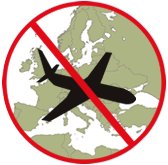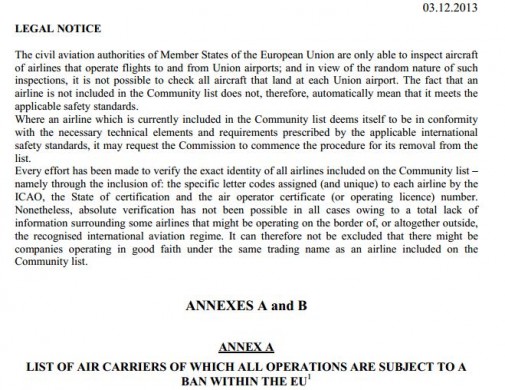 माई संसार---- युरोपका २८ वटा देश सम्मिलित युरोपियन कमिसनले हिजोदेखि नेपालका सबै
एयरलाइन्समाथि प्रतिबन्ध लगाएको छ। हिजो सार्वजनिक गरिएको प्रेस विज्ञप्ति
अनुसार नेपालका कुनै पनि एयरलाइन्सले युरोपका यी २८ वटा देशभित्र र
त्यहाँसम्म उडान गर्न पाउने छैनन्। तत्कालका लागि यसले खासै
माई संसार---- युरोपका २८ वटा देश सम्मिलित युरोपियन कमिसनले हिजोदेखि नेपालका सबै
एयरलाइन्समाथि प्रतिबन्ध लगाएको छ। हिजो सार्वजनिक गरिएको प्रेस विज्ञप्ति
अनुसार नेपालका कुनै पनि एयरलाइन्सले युरोपका यी २८ वटा देशभित्र र
त्यहाँसम्म उडान गर्न पाउने छैनन्। तत्कालका लागि यसले खासै कुनै असर गरिहाल्ने भने हैन। किनभने हाम्रा निजी एयरलाइन्सहरु त के राष्ट्रिय ध्वजावाहक नेपाल एयरलाइन्ससमेत युरोप नउडेको धेरै भइसक्यो। कमिसनको वक्तव्यमा नेपालका एयरलाइन्स नचढ्नू है भनेर आफ्ना देशका नागरिकलाई सीधै अनुरोध गरेको पनि देखिएको छैन। तर आत्तिएका डोमेस्टिक एयरलाइन्सहरु भने सरकारले चिनियाँ विमान किन्ने निर्णय गरेका कारण यस्तो प्रतिबन्ध लागेको भन्दै उफ्रिरहेका छन्। हो, विश्व राजनीतिमा चीन र युरोपको प्रतिस्पर्धा, प्रतिद्वन्द्विताका कारण युरोपेली विमान निर्माण कम्पनी एयरबसलाई चिनियाँ विमानले दिन सक्ने चुनौतिका कारण घुमाउरो किसिमले नेपाललाई चिनियाँ विमान किन्न लागेकोमा थर्काउन यस्तो गरिएको हुनसक्छ। मैले नबुझेको कुरा चाहिँ के भने यो प्रतिबन्ध लगाउनुको कारणबारे युरोपियन कमिसनले जुन सुरक्षाका प्रश्न उठाएको छ, त्यसमा चाहिँ गम्भीर हुनै नपर्ने? नेपालले चिनियाँ विमान किन्ने निर्णय गर्नुभन्दा अगाडिदेखि उनीहरुले नेपालको हवाई सुरक्षाबारे प्रश्न उठाइरहेका थिए। गएको तीन वर्षमा १० वटा दुर्घटना नेपाली आकाशमा भएका छन्, त्यसमा ९५ जनाको मृत्यु भएको छ। यति धेरै दुर्घटना त चिनियाँ विमानका कारण वा चीनका कारण भएको हैन। नेपाली विमान कम्पनी र नेपाली उड्डयन सुरक्षा हेर्ने निकाय नै हो यसको जिम्मेवार त। अहिले प्रतिबन्ध लाग्नुको अदृश्य कारण जे भनेर दावी गरिए पनि देखिने कारण त यही दुर्घटना र असुरक्षालाई नै देखाइएको छ। दृश्य कारण हाम्रै डोमेस्टिक एयरलाइन्स अनि हाम्रै उडान सुरक्षामा लापरवाही देखियो त। आफ्नो गल्तीहरु चाहिँ हेर्दै नहेरी अरुतिर मात्र दोष थोपरिरहने?
- विमान चालकहरुलाई इमर्जेन्सी पर्दा विमान कसरी चलाउने भनेर आवश्यक “Flight Simulator Training” सबैलाई दिन निजी विमान कम्पनीहरु किन कञ्जुस्याइँ गर्छन् ?
-भिजिबिलिटी कम हुँदा वा उड्न नसकिने स्थिति देख्दादेख्दै समेत पैसाको लोभमा पाइलटलाई विमान उडाउन दबाब कसले दिने गर्छ ?
- एयरपोर्टमा सामान स्केलमा तौलेर ट्रलीमा हालेर जहाजमा लोड गर्न लाँदा लोडरले दलालहरुसँग मिलेर थोरै पैसाको प्रलोभनमा परी सामान लुकाएर निश्चित मापदण्डभन्दा बढी तौल राखेर जोखिमपूर्ण रुपमा विमान किन उडाइन्छ ?
- विमान दुर्घटना हुँदा सत्य तथ्य पत्ता लगाउनतिर लाग्नुको साटो नागरिक उड्डयन र छानबिन आयोगले मरिसकेका विमान चालकहरुलाई जिम्मेवार देखाएर बिमाको ठूलो रकम निजी विमान कम्पनीहरुलाई दिन सहयोग किन गरिरहन्छ ? (धन्न, ‘चालक निदाएका कारण बस दुर्घटना’ जस्तो हेडलाइन अहिलेसम्म छापिएका छैनन्)
यस्ता प्रश्नका सूचि अरु धेरै हुनसक्छन्। चिनियाँ विमानको बहानामा यात्रु सुरक्षाका लागि गम्भीर खालका यस्ता प्रश्न ओझेलमा नपरोस् भन्ने हाम्रो चाहना हो। अहिलेको अभियान हेर्दा त सबै दोष चीनको विमानलाई थोपरेर आफू पानीमाथिको ओभानो बन्न खोजेको झैँ देखिएको छ।
यसरी लाग्यो प्रतिबन्ध
युरोपियन युनियनको आधिकारिक जर्नलमा पाँच महिनाअघि नै नेपालका एयरलाइन्सहरु प्रतिबन्धित हुनसक्ने जनाउ दिँदै यस्तो विवरण दिइएको थियो-
Air carriers from Nepalयसमा अन्तर्राष्ट्रिय नागरिक उड्डयन संगठन आइकाओले सन् २००९ मा गरेको अडिटमै नेपालमा अन्तर्राष्ट्रिय सुरक्षा मापदण्ड अनुसारको काम नभएको भनिएको छ। त्यसपछिका दुई वर्षमा पाँच वटा ज्यानै लिने दुर्घटना र यो वर्ष तीन वटा थप दुर्घटना भएको त्यसमा उल्लेख गर्दै नेपालका सम्बन्धित निकायसँग सन् २०१२ को अक्टोबरदेखि नै ताकेता गर्न थालेको भनिएको छ। त्यसपछि नेपालबाट प्राप्त सुरक्षा योजनाका कागजात जोखिमबाट मुक्त हुन अपर्याप्त भएको ठहर रहेछ उनीहरुको।
(71) The results of an ICAO audit in May 2009 found Nepal
not in effective compliance with the majority of inter
national safety standards. Although no SSCs were ident
ified, the audit showed that the competent authority of
Nepal was not capable of ensuring effective implemen
tation of international safety standards in the areas of air
operations, airworthiness and accident investigation, and
that there were significant findings affecting the country’s
capability also in the areas of primary aviation legislation
and civil aviation regulations, civil aviation organisation
and personnel licensing and training.
(72) Five fatal accidents, involving a number of EU citizens,
have occurred in Nepal involving Nepal registered aircraft
over a period of two years (August 2010 – September
2012). In addition, there were three more accidents in
2013.
(73) Consultations with the competent authorities of Nepal
started in October 2012, on the basis of safety-related
deficiencies identified by the ICAO USOAP audit in May
2009 and the high number of fatal accidents over a short
time period. No Nepalese air carrier operates in the
Union.
(74) As part of the consultations, the Commission received
documentation of the oversight activities planned and
carried out by the competent authorities of Nepal for
the years 2012 and 2013. The examination of this docu
mentation indicated that there remained some safety defi
ciencies and that the oversight activities seemed to be
insufficient with regard to controlling the identified
safety risks.
(75) The Commission, assisted by EASA, held technical
consultations with the Nepalese competent authorities
(‘CAAN’) in Brussels on 30 May 2013. During those
consultations the CAAN explained the situation in
depth and provided information related to the control
of safety risks. The explanations provided by Nepal
indicated that the oversight activities were more
complete than revealed in the preceding documentation
sent by Nepal. The CAAN also provided information on
the follow up of recommendations from accident inves
tigation reports and several safety initiatives. These safety
initiatives included the establishment of safety objectives
and safety targets. An effective implementation of all the
safety initiatives should lead to improved oversight and
better control of safety risks. The information provided
by the CAAN at the meeting will be verified by further
documentation review
(76) The air carrier SITA Air Plc Ltd also participated in the
technical consultation, where it provided information on
their safety related activities and the interaction with the
CAAN. SITA Air suffered a fatal accident in September
2012 and explained lessons learned from this accident.
(77) Several challenges remain for CAAN and the aviation
industry of Nepal, including factors such as recruiting
and keeping sufficient and competent staff in CAAN
and conducting air operations in a very demanding
mountainous environment. CAAN showed that it is
working on addressing these challenges and the
Commission will therefore continue to monitor the
situation in Nepal.
(78) ICAO will be carrying out an on-site coordination and
validation mission (‘ICVM’) audit in Nepal in July 2013
and it seems appropriate to wait for the results of that
ICAO activity before completing the assessment of the
safety situation in Nepal.
(79) Should the results of the ICAO audit or any other
relevant safety information indicate that the safety risks
are not adequately contained, the Commission would be
forced to take action in accordance with Regulation (EC)
No 2111/2005.
गएको ३० मे २०१३ मा त ब्रसेल्समा नेपाल नागरिक उड्डयन प्राधिकरणको टोलीसँग समेत युरोपियन कमिसनले छलफल गरेको रहेछ। त्यहाँ सीता एयरका प्रतिनिधि पनि सहभागी भएका रहेछन्। सीताको विमान पछिल्लो पटक काठमाडौँमा दुर्घटना भएको थियो। त्यतिबेला अधिकारीहरुले गरेको बयान भने उनीहरुलाई अलि चित्तबुझ्ने पाराको भएछ कागजातहरु भन्दा। त्यही बयान अनुसार प्रभावकारी रुपमा पालना भयो भने सुरक्षा जोखिमको नियन्त्रण हुने विश्वास उनीहरुले लिएका रहेछन्। तर प्राधिकरणको कुरालाई पुनर्पुष्टि पनि गर्न जरुरी रहेको लेखिएको छ। प्राधिकरण र हवाई उद्योगमा निकै चुनौति रहेको, प्राधिकरणमा पर्याप्त र दक्ष कर्मचारी आवश्यक भएको जस्ता बुँदा पनि त्यसमा छ।
२०१३ को जुलाईमा अर्को अडिट गर्ने, यो अडिटको नतिजा र अर्को कुनै सुरक्षा जोखिम हुनसक्ने जानकारी आए कारबाही गर्न बाध्य हुनसक्ने अन्तिम बुँदामा उल्लेख थियो।
नोभेम्बरको अन्तिम साता नेपालले चीनका विमान किन्ने औपचारिक सम्झौता भयो। चीनले विमान किन्न सहुलियत ऋण र अनुदानसमेत दिने गरी प्याकेजमा ६ वटा विमान लिने सहमति भएको हो। नेपालले फ्रिमा एउटा MA-60 र एउटा Y-12E पाउने हो भने अर्को एउटा MA-60 र तीन वटा Y-12E सहुलियत ऋणमा किन्न लागेको हो। त्यसअघि नै सेप्टेम्बरमा चिनियाँ विमान MA60 लाई नेपालमा उडाउन मिल्ने भन्दै प्राधिकरणले अनुमति (टाइप अप्रुभल) दियो। इयुले भने त्यो MA-60 विमानलाई अनुमति दिएको छैन।
ज्ञानेन्द्रकै पालमा किन्न खोजेको विमान
त्यो MA-60 ले नेपाललाई पहिलेदेखि नै दुःख दिइरहेको छ। ज्ञानेन्द्रले आफ्नो शासनसत्ता हातमा रहँदा चीनसँग यस्तै दुई वटा विमान सेनाका लागि १५.९ मिलियन डलरमा किन्ने भनी सहमति गरी ५.५ मिलियन डलर बैना समेत तिरेको थियो। तर २०६२/६३ को जनआन्दोलनपछिको सरकारले त्यो निर्णय रद्द गरिदियो। बैना रकमै झण्डै गुम्न लागेको थियो। नेपालले नागरिक प्रयोजनका लागि अर्को विमान लिने भन्थ्यो, चीनले बैना रकमै दिन्न भन्थ्यो। पछि ५० प्रतिशतमात्रै बैना रकम फिर्ता आयो। बाँकी रकम झ्वाम भयो। उतिबेलै नकिन्ने भनिसकेको MA-60 अहिले के कारणले दुई वटा किन्न मन लागेको हो, ऋण र फ्रिमा दिने पनि प्याकेज भएर हो कि !
चिनियाँ विमान पहिलो हैन
नेपालमा चिनियाँ विमान उड्न लागेको पहिलो भने हैन रहेछ। यति एयरलाइन्स र नेपाल एयरवेजले चिनियाँ Y-12 विमान उडाइसकेको रहेछ। भारतीय मिडियाका अनुसार यी विमान मर्मत संभार र नेपालको हवाई वातावरणका कारण छ वर्षभन्दा बढी टिक्न सकेको थिएन।
अनि लाग्यो प्रतिबन्ध
चिनियाँ विमान किन्ने औपचारिक सहमति भएको केही दिनमा नै इयुको यस्तो विज्ञप्ति आयो। खासमा यी चाइनिज विमान विदेशमा उडाउन भनी किन्न लागेको पनि हैन। यी विमान नेपाल वायुसेवा निगमले देशभित्र उडाउनलाई किन्न लागेको हो। विदेशमा उडाउन त युरोपेली देशमै बनेको एयरबस किन्न बैना रकम पठाइसकिएको छ।
European Commissionयस्तो छ प्रतिबन्ध सूचि-
Press release
Brussels, 5 December 2013
Aviation: Commission updates the European safety list of banned airlines
The European Commission has updated for the 22nd time the European list of airlines subject to an operating ban or operational restrictions within the European Union, better known as “the EU air safety list”. On the basis of safety information from various sources and a hearing both with the Nepalese aviation authorities as well as with a number of Nepalese carriers, the Commission decided to put all airlines from Nepal on the EU air safety list.
Siim Kallas, Commission Vice-President responsible for transport, said: “The current safety situation in Nepal does not leave us any other choice than to put all of its carriers on the EU air safety list. We do hope that this ban will help the aviation authorities to improve aviation safety. I have already asked the European Aviation Safety Agency to prepare an aviation safety assistance project for Nepal.
As a consequence of the ban on Nepalese carriers, they are prevented from flying into or within the Union. Also, European operators and travel agents will need to inform European travellers, who will have a right to reimbursement if they had booked a seat on a Nepalese carrier as part of a journey to Nepal, and decide not to use it.
The Commission decision is based on the unanimous opinion of the EU Air Safety Committee, which met from 19 until 21 November 2013. The EU Air Safety Committee consists of aviation safety experts from the Commission, from each of the 28 Member States of the Union, as well as from Norway, Iceland, Switzerland, and the European Aviation Safety Agency (EASA). The Commission decision also received a positive opinion from the European Parliament and the Council of Ministers.
Background
The updated EU air safety list includes all airlines certified in 21 states, for a total of 295 airlines fully banned from EU skies: Afghanistan, Angola, Benin, Republic of the Congo, the Democratic Republic of the Congo, Djibouti, Equatorial Guinea, Eritrea, Gabon (with the exception of 3 airlines which operate under restrictions and conditions), Indonesia (with the exception of 5 airlines), Kazakhstan (with the exception of one airline which operates under restrictions and conditions), Kyrgyzstan, Liberia, Mozambique, Nepal, Philippines (with the exception of one airline), Sierra Leone, Sao Tome and Principe, Sudan, Swaziland and Zambia. The list also includes 2 individual airlines: Blue Wing Airlines from Suriname and Meridian Airways from Ghana, for an overall total of 297 airlines.
Additionally, the list includes 10 airlines subject to operational restrictions and thus allowed to operate into the EU under strict conditions: Air Astana from Kazakhstan, Afrijet, Gabon Airlines, and SN2AG from Gabon, Air Koryo from the Democratic People’s Republic of Korea, Airlift International from Ghana, Air Service Comores from the Comoros, Iran Air from Iran, TAAG Angolan Airlines from Angola and Air Madagascar from Madagascar.
साभार : माई संसार






0 Comment:
Speak up your mind
Tell us what you're thinking... !